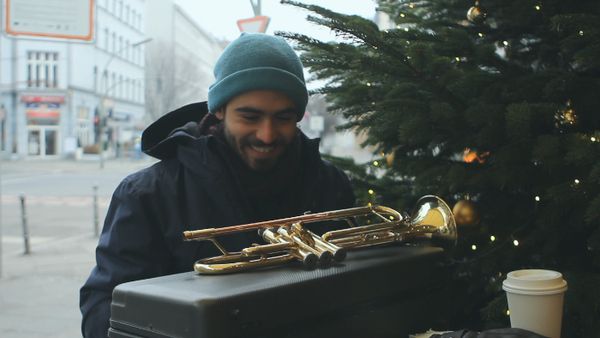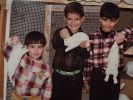Eye For Film >> Movies >> We Are From There (2020) Film Review
We Are From There
Reviewed by: Amber Wilkinson

Migration documentaries tend to follow a single person or family or to focus on groups all travelling together - good examples of which, should you be interested, include Midnight Traveller and, more recently, Purple Sea - but Wissam Tanios' very personal documentary takes an unusual approach in following two brothers, Milad and Jamil (who are the director's cousins) as they both decide, separately, to leave Syria for Europe. The resulting film is less about the physical journey the two take - one to Berlin and the other to Sweden - but the emotional ground that they have to cover in order to leave one home and establish another.
Tanios grounds his film well in the family's history, using the carpentry workshop of his cousin's father as a touchstone he returns to through home videos throughout the film, representing shared history and cultural tradition. Jamil has a love of the carpentry trade - although when we meet him, he has already begun his journey and is working as a car park attendant in Beirut, Lebanon - while Milad is a keen trumpeter, preparing to leave his job and even his beloved instrument behind in order to catch a boat to Europe. "I won't evolve if I stay here," says Jamil, while Milad says, "I am not a man of war. I am a musician."

Although the story is focused on the brothers, this is also a tale of loss for Tanios, who had a close bond with the pair when they were children after the death of his father, and who, in some ways, fears the change of their move more than they do. There's an honesty to the men's interactions borne out of their shared family experience that gives the film a more intimate feel than many of this type, while the focus presents a migrant portrait that avoids any suggestion of victimhood. Jamil and, particularly, Milad are aware that this isn't going to be easy - not the journey itself, although that holds its challenges - but the destination, where they know they will have to carve a new life, from work through to relationships, from scratch.
That they both are determined to go it alone - deliberately choosing different countries so that they can make it on their own rather than going to the same place - speaks of admirable determination and strength of character, although as Tanios shows it is not without its drawbacks, as Milad, in particular, goes through periods where he seems unwilling to communicate with family. Unfolding over five years, the film has time to show contradictory emotions, from the joy of Tanios bringing his cousin's trumpet to him - received as a tinny version of Silent Night plays in the background - to his sense of loss when his girlfriend moves to London and Jamil's obvious pride that he has built a carpentry firm from the ground up.
The story is fragmentary in places, largely because Tanios has to hop from place to place, but if it means it is less smooth it also emphasises the very different environments the brothers find themselves in. The film would also benefit from building a picture of what is happening back home once the men leave - we never see their family talk about their feelings following the departure, except for Tanios, which feels like a missing piece of a puzzle, especially given the strong sense of place he has established with the workshop at the start. The men are, more generally, captured in isolation and, though they obviously start out in the fresh countries that way it would have been nice to see more of the fabric of their new lives. What Tanios may lack in detail, however, he makes up for in mood, with a wistful melancholy accompanying much of what is documented, inviting you to contemplate what has led to the desire to uproot in the first place without losing its emphasis on what the brothers achieve when they do.
Reviewed on: 30 May 2021
















